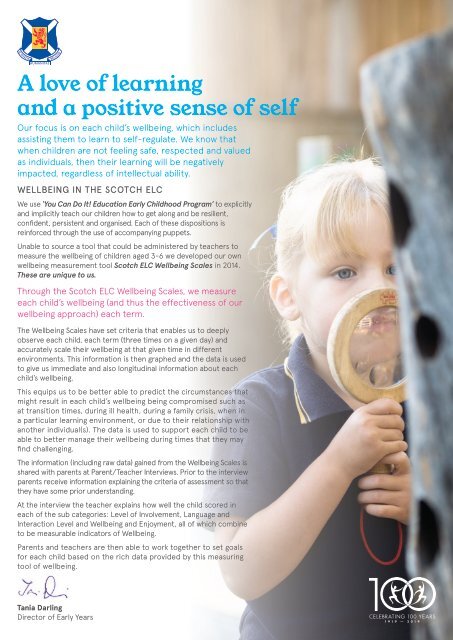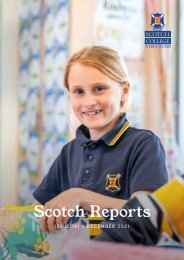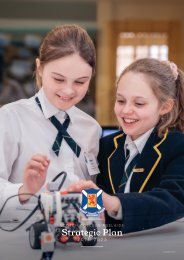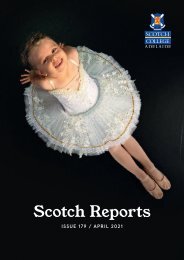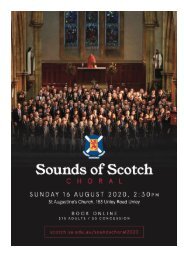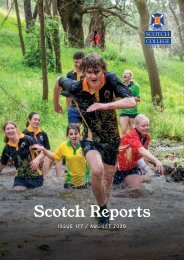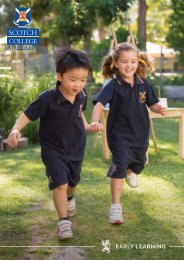ELC Wellbeing | Scotch College Adelaide
- No tags were found...
You also want an ePaper? Increase the reach of your titles
YUMPU automatically turns print PDFs into web optimized ePapers that Google loves.
A love of learning<br />
and a positive sense of self<br />
Our focus is on each child’s wellbeing, which includes<br />
assisting them to learn to self-regulate. We know that<br />
when children are not feeling safe, respected and valued<br />
as individuals, then their learning will be negatively<br />
impacted, regardless of intellectual ability.<br />
WELLBEING IN THE SCOTCH <strong>ELC</strong><br />
We use ‘You Can Do It! Education Early Childhood Program’ to explicitly<br />
and implicitly teach our children how to get along and be resilient,<br />
confident, persistent and organised. Each of these dispositions is<br />
reinforced through the use of accompanying puppets.<br />
Unable to source a tool that could be administered by teachers to<br />
measure the wellbeing of children aged 3-6 we developed our own<br />
wellbeing measurement tool <strong>Scotch</strong> <strong>ELC</strong> <strong>Wellbeing</strong> Scales in 2014.<br />
These are unique to us.<br />
Through the <strong>Scotch</strong> <strong>ELC</strong> <strong>Wellbeing</strong> Scales, we measure<br />
each child’s wellbeing (and thus the effectiveness of our<br />
wellbeing approach) each term.<br />
The <strong>Wellbeing</strong> Scales have set criteria that enables us to deeply<br />
observe each child, each term (three times on a given day) and<br />
accurately scale their wellbeing at that given time in different<br />
environments. This information is then graphed and the data is used<br />
to give us immediate and also longitudinal information about each<br />
child’s wellbeing.<br />
This equips us to be better able to predict the circumstances that<br />
might result in each child’s wellbeing being compromised such as<br />
at transition times, during ill health, during a family crisis, when in<br />
a particular learning environment, or due to their relationship with<br />
another individual(s). The data is used to support each child to be<br />
able to better manage their wellbeing during times that they may<br />
find challenging.<br />
The information (including raw data) gained from the <strong>Wellbeing</strong> Scales is<br />
shared with parents at Parent/Teacher Interviews. Prior to the interview<br />
parents receive information explaining the criteria of assessment so that<br />
they have some prior understanding.<br />
At the interview the teacher explains how well the child scored in<br />
each of the sub categories: Level of Involvement, Language and<br />
Interaction Level and <strong>Wellbeing</strong> and Enjoyment, all of which combine<br />
to be measurable indicators of <strong>Wellbeing</strong>.<br />
Parents and teachers are then able to work together to set goals<br />
for each child based on the rich data provided by this measuring<br />
tool of wellbeing.<br />
Tania Darling<br />
Director of Early Years


